
Germany - Harzer Schmalspurbahnen HSB
For a full scale picture, please click on the picture shown !
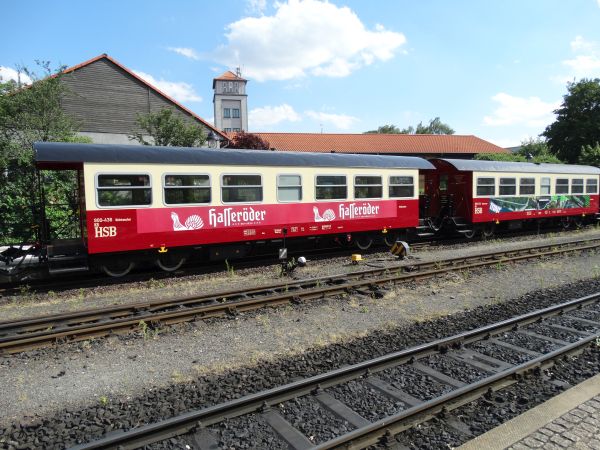
Coaches of Harzer Schmalspurbahnen. These old looking but modern coaches are used in the tourist traffic with steam locomotives.
Picture from Wernigerode 1.7.2019 by Ilkka Siissalo.
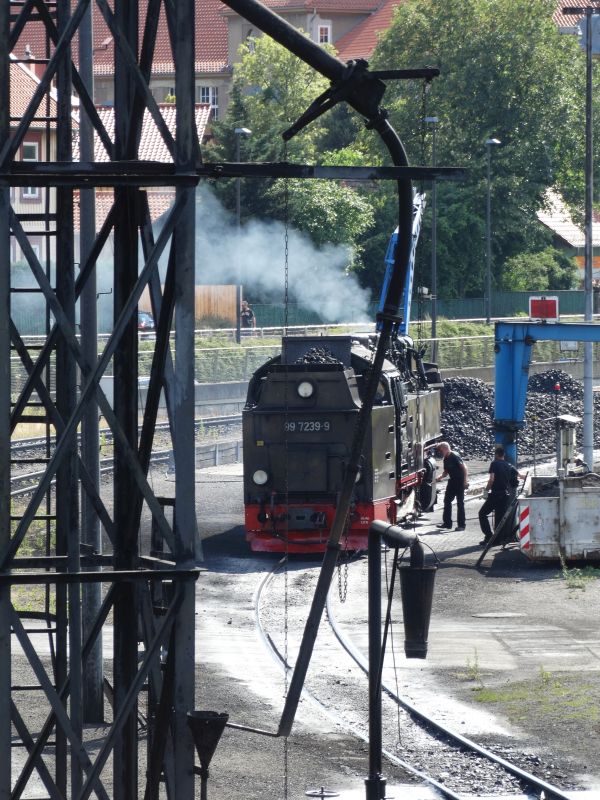
Br99 no.7239 has just gotten a full load of new coal and is now being oiled after a full days of work in front of tourist trains. The machine was built
in Babelsberg, that time East Germany 1954-56. DR originally had 17 of these locomotives. It belongs to the locomotive class classified by the
builder as K 57.10 and its top speed is 40 km/h.
Picture from Wernigerode 1.7.2019 by Ilkka Siissalo.
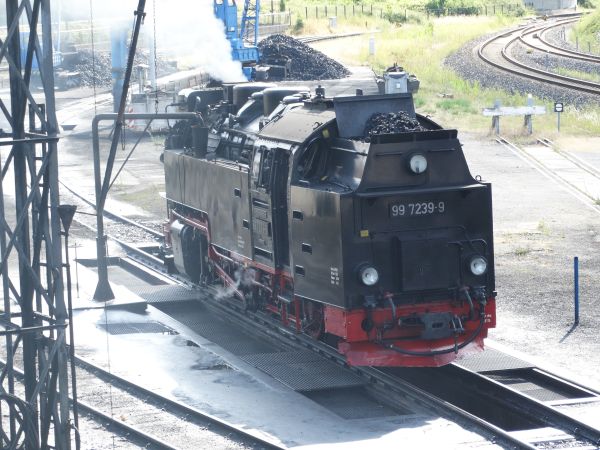
The same old Br99 as above, here being filled up with water.
Picture from Wernigerode 1.7.2019 by Ilkka Siissalo.
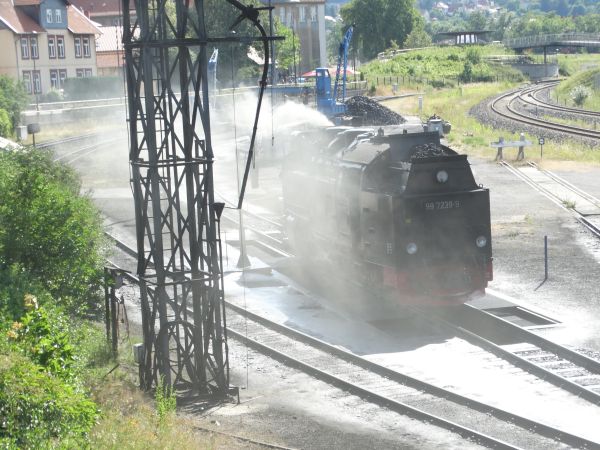
The old steam locomotives cause a lot of smoke problems for local residents. And the smell is far from nice.
Picture from Wernigerode 1.7.2019 by Ilkka Siissalo.
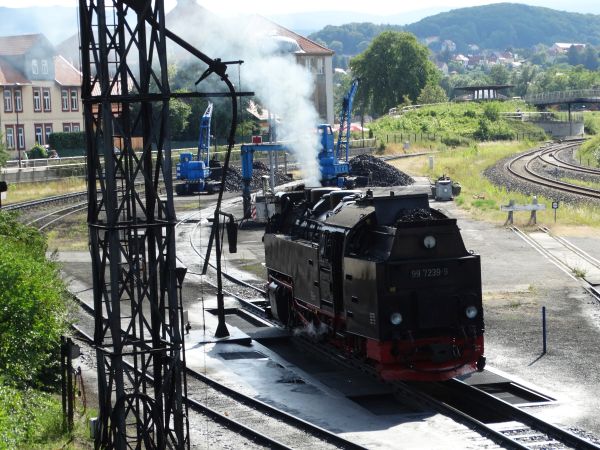
Br99 ready for the next working day.
Picture from Wernigerode 1.7.2019 by Ilkka Siissalo.
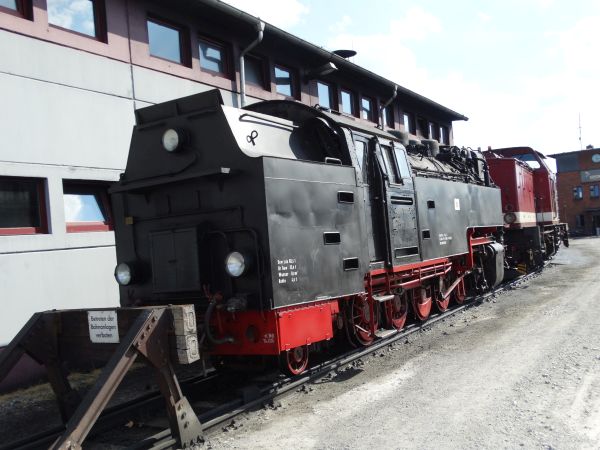
Another class 99.723 / 99.724 steam engine, but we don't know its serial number, as someone has stolen both its owner name plate as well as its number plate.
Picture from Wernigerode 1.7.2019 by Ilkka Siissalo.
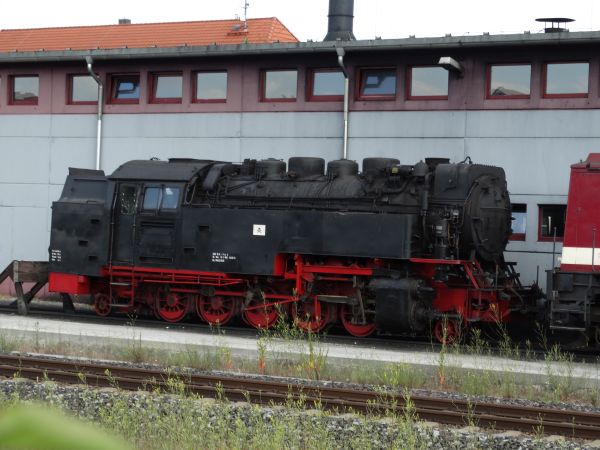
The same steam engine as above, but seen from its side.
Picture from Wernigerode 1.7.2019 by Ilkka Siissalo.
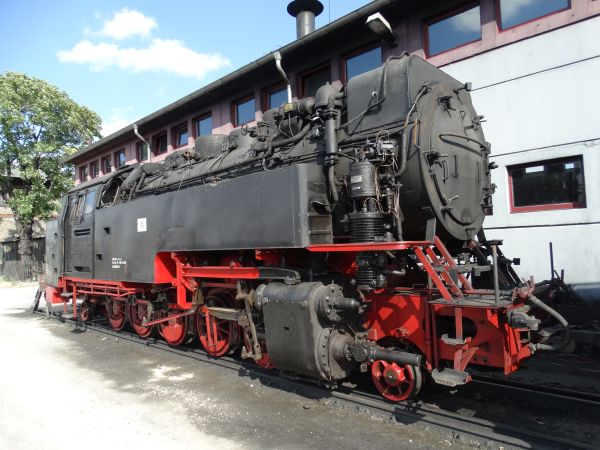
Still the same machine as above, but now in a closer look.
Picture from Wernigerode 1.7.2019 by Ilkka Siissalo.
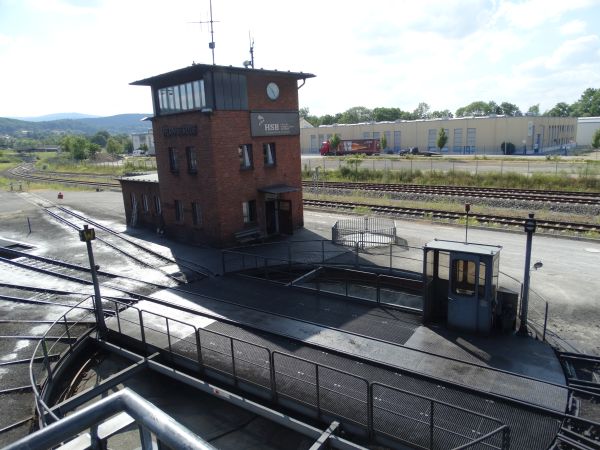
The turntable and traffic control tower of Wernigerode.
Picture from Wernigerode 1.7.2019 by Ilkka Siissalo.
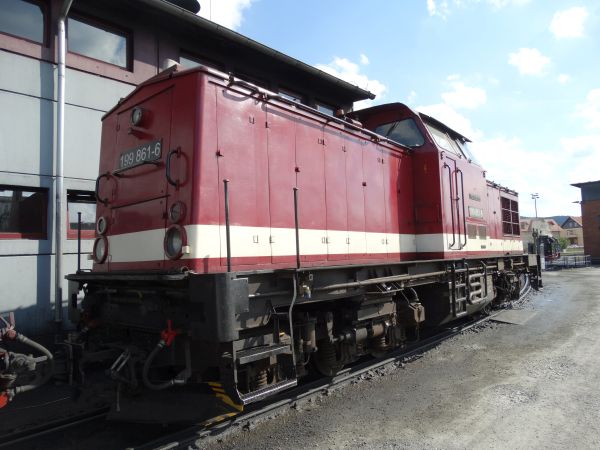
In the 1980s during the communist times DR of DDR wanted to get rid of the smokey steam engines at the Harz narrow gauge routes and they would have wanted to buy
new diesel engines. But the cooperation agreements between Warsaw Pact countries did not allow East Germany to build diesel locomotives any longer, but that right
was reserved to Russia and Romania. DR did not want to buy either Russian or Romanian machines as they were known to be of poor quality, so instead they let modify
existing normal gauge V100 locomotives from 1435 mm gauge to meter gauge. The four axle locomotives also had to be modified into six axle machines, as some of the rails
at Harz did not allow higher axle loads. The result was this, Br199.8. Due to its new bogies the machine is now surprisingly tall and especially the driver's cabin
stands really high up. Very quickly the machines got the nickname "Harzkamelen", camels of Harz. The plan was to produce 50 machines this way, but in the end only
ten were converted 1988-1990 and even out of those four have already been converted back to normal gauge. In 2019 six Br199.8 machines are left and three out of them
are still in working order. This is one of them.
Picture from Wernigerode 1.7.2019 by Ilkka Siissalo.
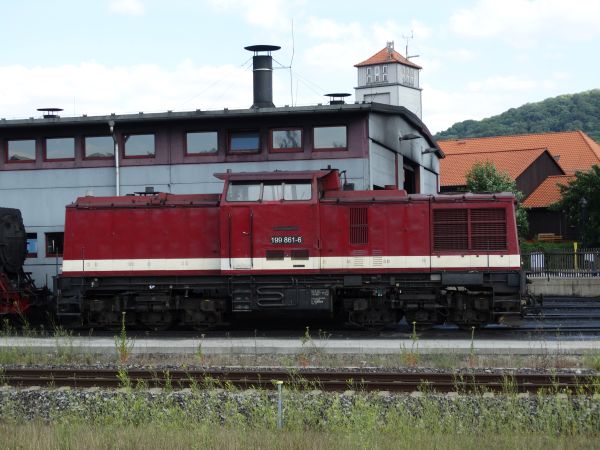
The same "Harzkamel" 199.861 as above, but seen from its side.
Picture from Wernigerode 1.7.2019 by Ilkka Siissalo.
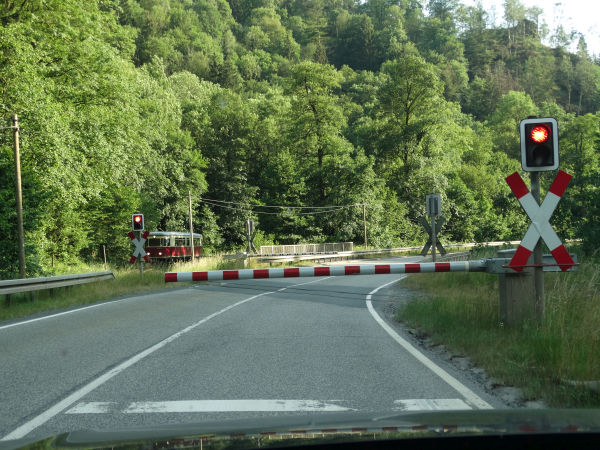
Much of HSB's business is hauling foreign tourists with trains that have steam locomotives, but not all. HSB also serves the local population on a fairly
large geographical area and it does so in a very tramlike manner. Actually those trains run under the German laws governing tram traffic, although they are
diesel driven. Some of the lines climb up the hills of Harz fairly high up, but the most dense traffic takes place on the flatland. Here one old diesel
wagon is climbing the steep hills by a riverside in gorgelike valley. The wagon is a Br187 built by Talbot in 1955. Its power rating is 2x210 horsepowers
and its top speed is 60 km/h.
Picture from a railway crossing at Eisfelder Talmühle between Nordhausen and Wernigerode 1.7.2019 by Ilkka Siissalo.
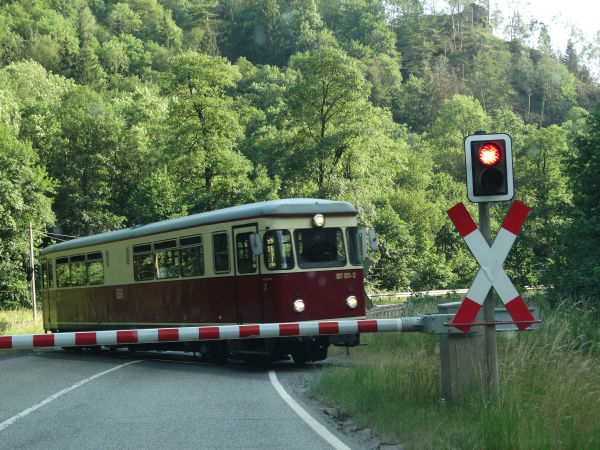
The same Br187 011 motorwagon as above. Here it had just reached the street crossing. It was built by the company Talbot in 1955 for Kreis Altenaer Eisenbahn.
There were two of these dieselmechanic wagons. Later they went to the island of Langeoog to run for DB there on the Nordfriesische chain of islands and when they
were not anymore needed even there, they came in the mid-1990s to HSB. Now numbered 187 011 and 013, they are currently used only as a reserve.
Picture from a railway crossing at Eisfelder Talmühle between Nordhausen and Wernigerode 1.7.2019 by Ilkka Siissalo.
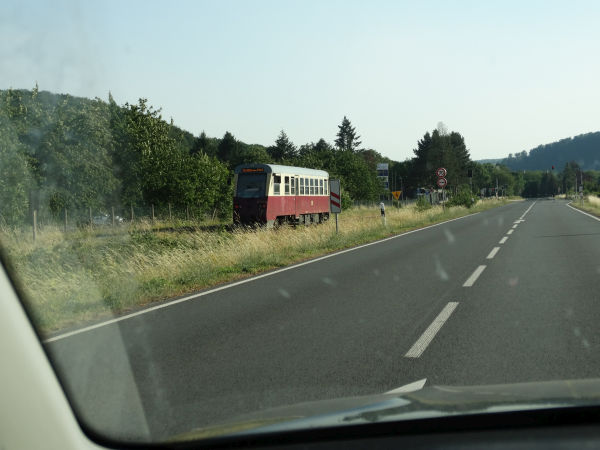
One of HSB's newest tram-like diesel trains, the Br187 no.017 is slightly faster than a car that tries to keep to the speed limits. If it were not for the frequent
tram-like train stops, it would never have been possible to catch up with the train.
Picture from between the train stops in Cleysingen and Woffleben 1.7.2019 by Ilkka Siissalo.
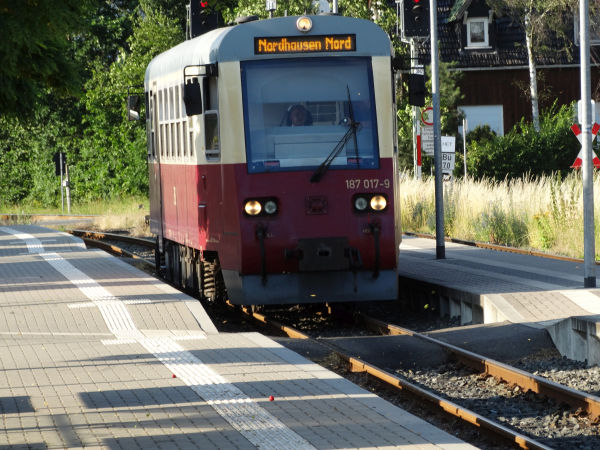
The same diesel tram-train as above, Br187 017. These newer wagons, Br187 016 to 019 were built after the communist times in what already was DB Spezialwerk
Halberstadt. It is a computer controlled 345 horsepowers strong dieselhydraulic wagon with a Vmax of 50 km/h.
Picture from the train stop of Niedersachswerfen Ost 1.7.2019 by Ilkka Siissalo.
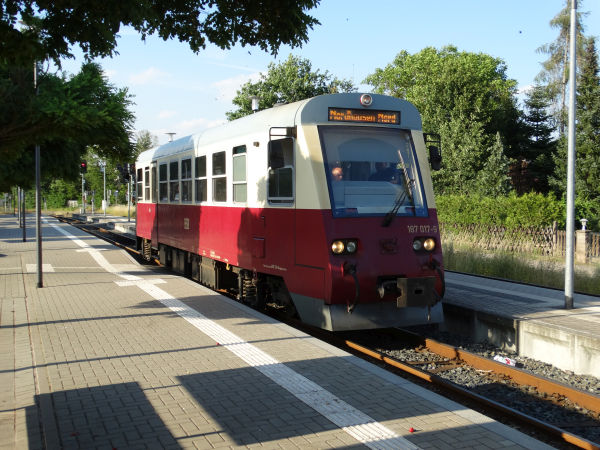
Another view of the same Br187 017 as above.
Picture from the train stop of Niedersachswerfen Ost 1.7.2019 by Ilkka Siissalo.
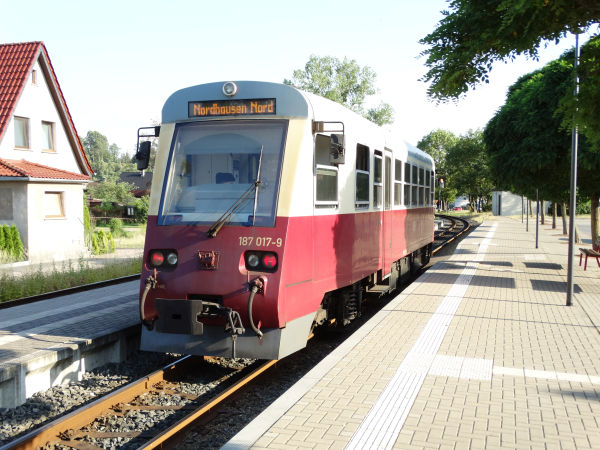
Still the same Br187 017 as above, but seen from the other side.
Picture from the train stop of Niedersachswerfen Ost 1.7.2019 by Ilkka Siissalo.
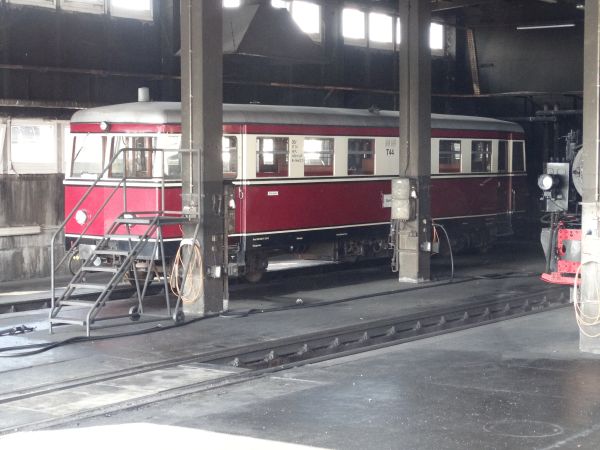
This old narrow gauge motorwagon "T44" does not actually belong to Harzer Schmalspurbahnen, although it is here photographed at HSB's garage halls at Wernigerode. It is a
69 years old machine which belongs to Deutschen Eisenbahn-Verein (DEV). It had been brought to HSB's net as a guest for the celebrations of the so called Sachsen-Anhalt-Days
and it circulated from 31st May to 2nd June 2019 as well as on the 21st of June with passengers between Wernigerode and Quedlinburg. Normallly this oldie is kept at the
Selfkantbahn. It was built by Talbot in 1950.
Picture from Wernigerode 1.7.2019 by Ilkka Siissalo.
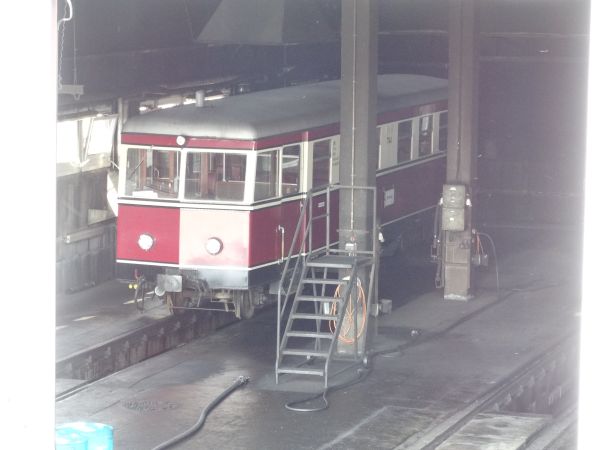
The same old visiting T44 seen more from its front.
Picture from Wernigerode 1.7.2019 by Ilkka Siissalo.

